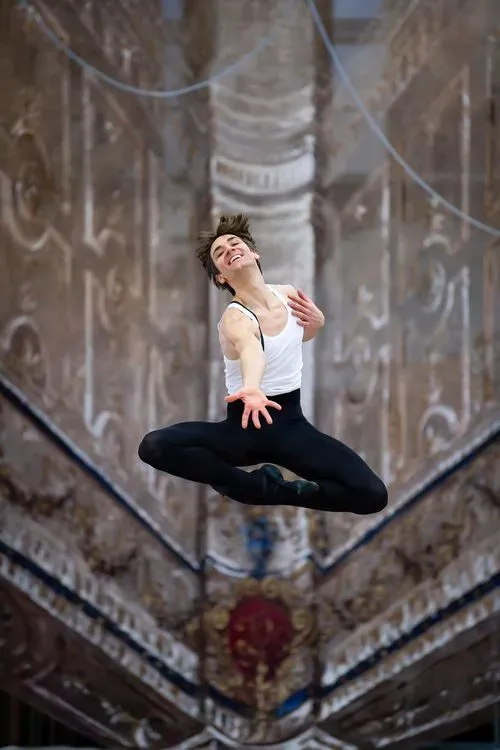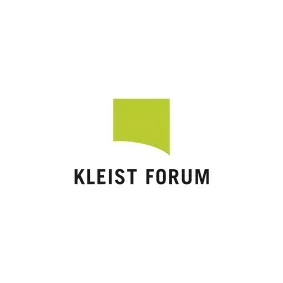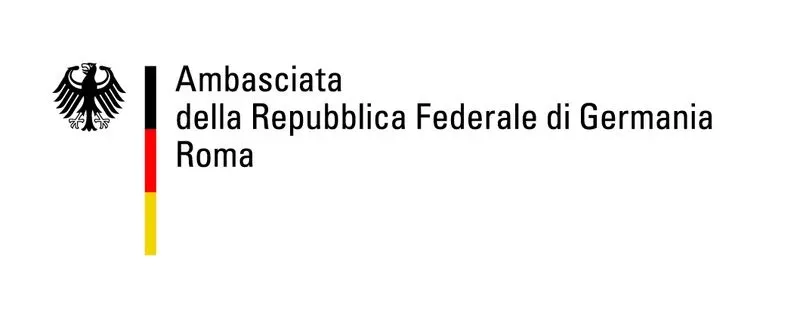



.webp)
Friedemann Vogel
Die Seele am Faden / Soul Threads
After Not in My Hands, world dance star Friedemann Vogel returns to to collaborate with visual artist and choreographer Thomas Lempertz, this time to try his hand at choreographing a'opera complete: Die Seele am Faden/Soul Threads. Directed and conceived by the two artists, this new creation is inspired to by Henrich von Kleist's The Puppet Theater with the intention of exploring opposites-how the natural can spring from the unnatural, sensibility from artifice, and grace from a trained body-in a parallel between the puppet and the dancer both interpreters of someone else's vision.
A recipient of the most prestigious awards in dance, Vogel routinely dances on major stages around the world, from La Scala in Milan to the Bolshoi Theater in Moscow to the World Ballet Festival in Tokyo, winning over critics and audiences alike. The first soloist of the Stuttgart Ballet, Vogel is celebrated for both his deeply moving interpretations in dramatic ballets and his energetic performances in more contemporary works. Since 2015, he has held the national title of "Kammertänzer," the highest honor for a dancer in Germany.
dance performance with Friedemann Vogel
Based on the text The Puppet Theater by Heinrich von Kleist
conception and direction Thomas Lempertz, Friedemann Vogel
Composition and live music Alisa Scetinina (GAISMA)
digital artist Timo Kreitz
sets and costumes Thomas Lempertz
lights Fabiana Piccioli
technical director Stefan Welker
Kleist Forum production
In collaboration with Kleist Museum
Global Arts Link tour producer





INFORMATION
The show involves the use of strobe lights.
Friedemann Vogel: Homo versus machina
Heinrich von Kleist, Frankfurt-based playwright and poet, stands out among the founding thinkers of a renewed theater of the body, for his Über das Marionettentheater, an essay where, in the form of a dialogue with a dancer he met in the park, he addresses the theme of "grace," defending the superiority of the puppet over the dancer, in that it is not anchored to the ground or gravity; it therefore has no technical limitations, unlike the human being, endowed with a soul.
Text by Elisa Guzzo Vaccarino
__
The wise dancer - according to Kleist - enlightened the writer, on the dynamics of movement induced by the strings, explaining "that every time you move the center of gravity in a straight line, the limbs have already described curves; and that often, shaken in a purely accidental way, the whole turns into a kind of rhythmic movement similar to a dance."
The puppet and the dancer are both moved from who designs gestures, movements, choreography, narratives for them; the dancer: trained body, special body, but natural; the puppet: artificial, constructed, "superior" body. Can the artificial body become natural? Is a trained, special human body in any way artificial?
Friedemann Vogel is a preluded artist of the body, a thinker of the flesh, an absolute leading figure at the top of the glorious Stuttgarter Ballett, the classical company that under the creative leadership of John Cranko, a South African of English school, realigned Germany with the West after World War II in distancing itself from Ausdruckstanz, expressive modern dance, which had become politically uncomfortable in the West.
In his 40s - he was born to Stuttgart in 1979 - with a boyish face and meticulously sculpted Caravaggesque musculature, Friedemann Vogel, reserved, hard-working, completely dedicated to dance, is one of the leading international dancers of his generation, a first-class performer, awarded the supreme honor of Kammartänzer; winner of the Prix de Lausanne, the Erik Bruhn Prize and the Prix Maya, as well as prized guest at La Scala in Milan as at the Bolshoi in Moscow as to Tokyo. He was chosen, in 2021, to launch the official message of International Dance Day: "We dancers are often celebrated for physical prowess, while in fact we are much more supported by mental strength. I believe it is this unique combination of physical and psychological agility that helps us to surpass ourselves, to reivent ourselves to continue to dancing, continue to inspiring."
Now, at the pinnacle of a global career, Vogel launches a new challenge to himself, in coming up with works of his own, with the complicity of the multifaceted Thomas Lempertz, "visual artist, whose practice is strongly based in dance"-that's how he identifies himself-, fashion designer and costume designer, former soloist to Stuttgart, and then choreographer, who has proved a partner of choice in his friend Friedemann's personal projects; now precisely on the man-mare relationship treading in Von Kleist's footsteps.
"A new challenge faced together, after the precedent of Not in my Hands, a solo overflowing with emotions, between fear and courage, prison and freedom, loss and hope, ebb and flow," - comments Vogel - "born from the painful feelings of a dancer in the dramatic moment of the theaters closed for the pandemic, and acted on Mozart's fatal Requiem." "From the restrictions comes a certain freedom, and in the isolation, in the abundance of physical space, a new space is created, for reflection and creation" - declared the dancer in 2021 for Not in my hands - "If everything seems impossible, everything becomes possible," dropping all illusions of power, surrendering to the waves of fate, but using obstacles as a propellant of energy, struggling to move forward anyway.
In 2024 Vogel, again with Lempertz, tried his hand at choreography a new "dance performance" to Full evening: Die Seele am Faden/ Soul Threads, or The Threads of the Soul in English or The Soul on the Wire in German, a title that reveals in every language the mood of this intriguing adventure, created in collaboration with the Kleist Museum.
The music is by Alisa Scetinina, originally from Riga, also a dancer to Stuttgart – from the same artistic family, therefore – which after six years of work as a dancer, has passed to she studied Fine Arts and devoted herself to music, a terrain on which she had already measured herself in her Latvia, to the piano and violin; The multifaceted artist has also put herself to the test by singing and acting and, as a self-taught, applying herself to the guitar; She is also active as a producer with a passion for analog equipment and old-school instruments, which she uses in her live sets. Scetinina also loves digital photography and video. Composer, director and performer, she moves nimbly between choreography and improvisation. Vogel's team also includes digital artist Timo Kreitz, a specialist in motion design and spatial and immersive experiences, and light designer Fabiana Piccioli, from Rome, with a degree in philosophy, with training in dance, collaborator of Akram Khan, Romeo Castellucci, Sidi Larbi Cherkaoui, of the English National Ballet, of the Ballets de Montecarlo, also engaged on the front of theopera at La Scala in Milan, winner of two Knight of Illuminations Awards for Dance and one forOpera.
Die Seele am Faden/Soul Threads is on stage, in the rich program of the Spoleto Festival, to San Simone, a former church, where the ideal climate is created for this intense and cultured solo. Friedemann Vogel, an excellent partner of bow dancers in the world, has the temperament and maturity to apply himself to practice and theory, as he demonstrated in the performance Écorché-Anatomie des Tanzes, and in the panel on the subject, last March at the University of Tübingen in the Andere Ästetik program. He is the actor-subject of works of video art, such as Cadavre Exquis by Damiano Pettenella & Roman Novitzky and the protagonist of the documentary to all-round Verkörperung des Tanzes direct from Katja Trautwein.
In the highly demanding art of dance, which asks the body for every care, every attention, every breath, in search of perfect control, accepting to put itself in the hands of others, preparing every sinew and every neuron to correspond to the image from return, in the face to a pandemic stop or confrontation with the heterodirected body of the puppet, absolute dedication is required. A talent that to Vogel certainly does not lack.
Homoversus machina: Die Seele am Faden/Soul Threads picks up the thread of a long-standing discourse on the presence, physicality, and efficacy of the dancer; who is the better? The puppet without consciousness or the human being? Will technique, agility, discipline, harmony, authenticity, soul, give the palm to the dancer?
"My body is the instrument of my soul," says Friedemann Vogel, for whom dancing is communicating, with feeling. "It is not the beautiful to to be desirable, but rather the real"-he says, since the artist depends on his or her body; "this is the common thread to to which all dancers cling."
And it should come as no surprise that a great dancer-interpreter, who knows himself in every detail, who is strong from a lived experience at the pinnacles of ballet in the temples of the body in performance, wants to take over the investigation of the meaning that his own daily, diuturnal and determined actions project into his intimate life and in the eyes of the audience: almost a meditation, a spiritual exercise, a book of 'at written with skin, bones, tendons, nerves, brain, heart.
Born to Stuttgart, Germany, Friedemann Vogel completed his ballet training at the Princess Grace Academy in Monte Carlo with the John Gilpin Scholarship from Princess Antoinette of Monaco. In 1998, Vogel joined to the Stuttgart Ballet and in 2002 was promoted to first soloist, the highest rank in the company. Vogel participates to in international ballet galas and is a guest artist with such renowned companies as the Mariinsky Theater, Bolshoi Ballet, La Scala Theater, English National Ballet, Chinese National Ballet, Tokyo Ballet, the Ballets of Santiago de Chile, the Finnish National Ballet, the Berlin Staatsballett, the Bayerisches Staatsballett, the Teatro dell'Opera in Rome, the Royal Swedish Ballet, the Vienna State Ballet, the Korean National Ballet, and the Lausanne Ballet Béjart. Her extensive repertoire includes from leading roles in the classics and principal roles in works by choreographers ranging from Cranko and Balanchine to Robbins and Kylián, from MacMillan and Neumeier to Forsythe and McGregor. He has won prestigious awards in his career, notably the Erik Bruhn Prize, Eurocity Competition, Léonide Massine Positano Prize, Prix de Maya, and the "Outstanding Performer" Award at the German Dance Prize. Vogel was also named "Best Dancer" by the Italian magazine Danza&Danza in 2011, and was elected "Dancer of the Year" twice by Tanz Magazine, in 2010 and 2019. In 2015 he was awarded the title of "Kammertänzer," the highest honor for dancers in Germany, and in 2021 he was chosen as an ambassador for the International Day of Dance under the patronage of UNESCO.
A visual artist whose practice is firmly rooted in dance, Thomas Lempertz was born to Pforzheim, Germany. After a successful career as a soloist at the Stuttgart Ballet, Lempertz left dance in 2003 to pursue fashion design and was nominated for the "New Faces Award Fashion" in 2011. Since 2013, he has been designing costumes for internationally renowned choreographers. In 2015, he returned to the stage with Greyhounds, a solo created especially for him from Marco Goecke, as part of an Egon Madsen project for former dancers at Theaterhaus Stuttgart. Lempertz's broad interests led him to to pursue studies in Intermedia Arts at the Stuttgart Academy of Fine Arts from 2015 to 2017. Lempertz has also taught art and movement workshops as a guest lecturer at the Stuttgart State Academy of Fine Arts and in a Dance, Choreography and Movement workshop and at the Ludwigsburg Film Academy. Moving steadily between the three integral pillars of his artistic expression-dance, art and costume-Lempertz has gravitated increasingly toward his practice as a visual artist, while remaining true to his approach as a dancer. Major exhibitions include the three solo shows Liquid Skin in 2019, Motion is Solution in 2021 and Liquid Gravity at Galerie Kernweine in 2023, as well as the group shows Inszenierung I Inspiration Tanz und Fotografie at Deutsche Tanzmuseum Köln in 2021 and What I like in 2022 at Galerie der Stadt Sindelfingen.
Born in Latvia, she has been involved in music and dance since childhood. At the age of fifteen, she moved to Germany to study at the Ballet Academy. She joined to the Bavarian StateOpera , then the Stuttgart Ballet and toured with both companies. After a six-year career in ballet, she decided to enroll in the Stuttgart Academy of Fine Arts, investing all her free time in exploring music. From from an early age, in her hometown of Riga, she takes acting and singing classes, as well as to learning to to play piano and violin. She also learned to playing guitar and to producing, quickly developing a passion for analog and old-school equipment that she uses in her live sets today. In addition to her musical work, Scetinina is involved in visual projects. These include analog and digital photography, behind and in front of the camera, as well as collages and video works, which she often relates to music. Symbioses of auditory and visual materials emerge, in which the artist presents herself in an increasingly contemporary form of movement. Opera as a composer, director of photography and performer in her works that oscillate between choreography and improvisation.
Digital artist with a background in Visual Communication (at the University of the Arts Berlin) and a specialization in Motion Design (at the Baden-Württemberg Film Academy in Ludwigsburg, Germany). He designs immersive spaces and interactive installations that invite visitors to challenge their senses and expand their personal horizons. The use of cutting-edge technologies and a wide variety of software and hardware solutions strongly influence his work. In his work he relates with partners representing different disciplines and experiments with designers, musicians and dancers. He researches the overlap between the physical and virtual worlds and combines different techniques in his creations to radically expand the possibilities of visual design and develop cutting-edge aesthetics. Besides to working as creative director for a renowned communications agency, he develops and produces work for fashion, art, and cultural projects. He lives and works to Berlin.
After graduating in Philosophy from La Sapienza University in Rome, followed from by a brief European career as a dancer, Fabiana Piccioli learns to dealing with production while working at Romaeuropa Festival. In 2005 she joined to the Akram Khan Company as technical director and began to developing her career as a lighting designer. A freelance lighting and set designer since 2014, Piccioli lives to Rome and, in his career, has worked for Royal Opera House, Royal Danish Opera, Teatro La Scala, Scottish Opera, Opera National du Rhin, Opera de Lille, National Irish Opera, Paris Opera Ballet, Ballet de Lyon, Goteborg Ballet, Finnish National Ballet, Royal Ballet of Flanders, ENB, Schaubühne Berlin, Stuttgart Ballet, Royal Court, Theatre de la Ville, New York City Ballet, Sadlers Wells and Les Ballets de Monte Carlo, among others. He has collaborated with internationally renowned artists, including choreographers such as Akram Khan, Sidi Larbi Cherkaoui, Damien Jalet, Johan Inger, Imre and Marne van Opstal, Aakash Odedra, Kim Brandstrup and Jeroen Verbruggen, theater directors such as Romeo Castellucci, Guy Cassiers, Lisaboa Houbrechts and Katie Mitchell, and directors of 'opera such as Oliver Mears, John Fulljames and Philipp Himmelmann. He has won three Knight of Illumination awards: two for dance and one foropera.
Il Posto / Wanda Moretti
+ Marco Castelli Small Ensemble
Adrien M & Claire B
Wayne McGregor
Il Posto / Wanda Moretti
+ Marco Castelli Small Ensemble